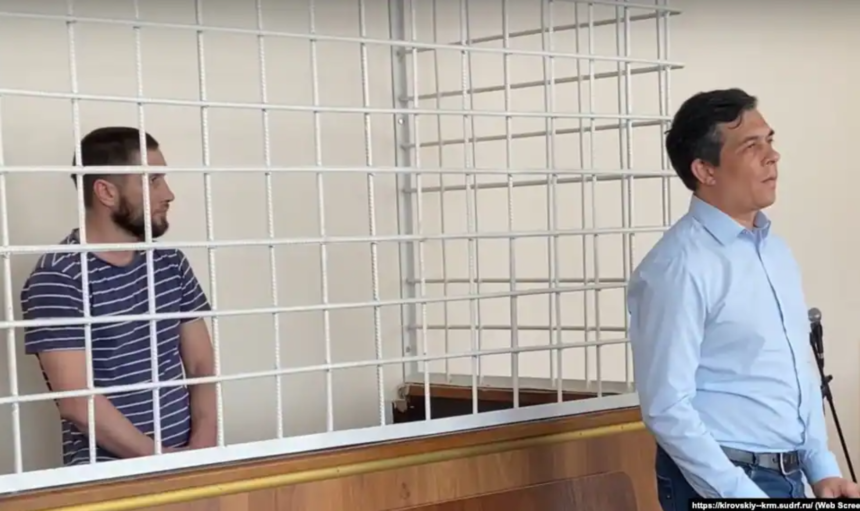Following Russia’s illegal annexation of the Crimean Peninsula in 2014, many court hearings have been held behind closed doors, without public presence, media access, or independent lawyers. Among those sentenced for their opposition to the Russian state in Crimea, last year were Ukrainians captured from other parts of the country that fell under Russian occupation.
After a decade under Russian occupation, the Ukrainian peninsula of Crimea is now a less free place, particularly for those who dared to oppose the Kremlin.
However, it is not just cases involving Crimean locals that are being prosecuted by Moscow-controlled judges these days.
Since Russia launched its full-scale unprovoked invasion of Ukraine in February 2022, the penal facilities in Crimea have become the new home for many politically active Ukrainians abducted from other parts of the country that fell under Russian control.
Radio Free Europe monitored several of the most significant trials that took place on the Black Sea peninsula in 2024.
Crimean Resident Sentenced for Opposing the “Z” Symbol
In August 2023, Crimean resident Dilaver Salimov expressed his anger upon seeing an associate wearing a baseball cap with the “Z” symbol, which promotes and justifies Russia’s military aggression. This occurred at a fuel station in the small town of Staryi Krym.
Salimov demanded that the associate remove the cap and allegedly threatened, “I will pay someone to set him on fire.”
Footage of the incident was posted on a Telegram channel, allegedly linked to Russia’s Federal Security Service, and reports of Salimov’s detention followed swiftly.
Initially, Salimov was fined for “discrediting the Russian military.” The charges of threatening with death were only brought after he refused to apologize in a video while in pre-trial detention, according to the Crimean Human Rights Group.
His trial began in February 2024 and was closed to the press.
Salimov’s lawyers criticized a linguistic analysis used in the case, claiming it contained several spelling, punctuation, and basic logical errors.
Judge Georgy Tsertsvadze ignored these complaints, sentencing Salimov to one year in a penal colony (a form of punishment where the accused is isolated from the rest of the population).
Salimov is a Crimean Tatar, part of a Turkic-speaking ethnic group, mostly Muslim, native to Crimea.
In a report marking the 10th anniversary of Russia’s occupation of the peninsula last year, the human rights watchdog Amnesty International accused Russia of “attempting to alter the ethnic composition of Crimea by suppressing non-Russian identities on the peninsula.”
Moscow has done this by “limiting education in Ukrainian and Crimean Tatar languages, targeting religious minorities, stifling media and culture, undermining institutional representation, and abusing the criminal justice system,” the organization said, citing data indicating that “Russia has transferred its own population into Crimea in violation of international law.”
The Peninsula for Prisoners
According to the Crimean-focused civic group Irade, threats of violence against Crimean residents known to support Ukraine have been common throughout the occupation.
Formal prosecution, as in the case of Salimov, remains rare.
However, since Russia’s full-scale unprovoked invasion began in 2022, there have been several high-profile cases of residents from other occupied regions of Ukraine being forcibly transferred to the peninsula to face arbitrary justice.
Ukrainian activist and writer Serhiy Tsihypa was abducted by Russian forces from his hometown of Nova Kakhovka in the Kherson region in March 2022, after the city fell under Russian control.
Tsihypa was a volunteer and provided food and medicine to the elderly in the then-occupied territories.
He was held for nine months without charges, legal counsel, or contact with his family before being coerced into confessing and accused of espionage.
In October 2023, the “Supreme Court of the Republic of Crimea,” appointed by Russia, sentenced Tsihypa to 13 years in prison on the charges levied against him.
In February 2024, this decision was upheld.
Tsihypa is now serving his sentence away from Nova Kakhovka and Crimea, in a maximum-security penal colony in Russia’s Ryazan region.
Another Ukrainian activist, Oleksandr Tarasov, was in detention with Tsihypa in Simferopol, Crimea.
Tarasov, who was released in 2023 and allowed to reunite with his family in Germany, stated that Tsihypa suffered torture and brutal mistreatment because of his past service in the Ukrainian military and security services.
Less is known about the trial of Iryna Horobtsova, an IT specialist and human rights defender, who publicly opposed Russia’s invasion of the city of Kherson and disappeared in May 2022.
After initially denying any involvement in her disappearance, Russian authorities confirmed in August 2024 that Horobtsova was sentenced to 10 and a half years in prison for espionage.
Prosecutors claimed Horobtsova “collected and transmitted information (to Ukrainian intelligence) regarding the locations, schedules, routes, and movements” of Russian military units in her region of origin. They alleged that this occurred “from February 2022 to March 2023,” but Ukrainian and international human rights groups raised concerns about her abduction and transfer to Crimea during this period.
Dmytro Shaynoga, a resident of the Zaporizhzhia region of Ukraine, which was partially occupied by Russian forces, was abducted in October 2022 and later found in a detention facility in Crimea by the secretive human rights group Tribunal.Episode Crimea.
In October 2024, Russia’s Office of the Prosecutor General announced that Shaynoga was sentenced to 12 years in prison after being accused of providing locations for operations used by Ukrainian intelligence. It is unclear how he was convicted or whether he had access to a lawyer. The decision was attributed to a court in Zaporizhzhia.
Retribution for the Nord Incident
The incident drew significant attention from Russian propaganda.
In May 2022, two Ukrainian border guards involved in the operation, Ivan Tereshchenko and Vasyl Dmytriuk, were captured by Russian forces during the siege of Azovstal in Mariupol.
Accused of hijacking a ship and abducting its crew, both men pleaded not guilty during their trial in Simferopol, arguing they had acted according to official orders to protect Ukraine’s borders.
Despite inconsistencies in the prosecution’s case and the judge’s refusal to accept evidence offered by the defense, both were sentenced to 17 years in prison. Russian media reported in June 2024 that the sentences remained in force even after an appeal was made in November.
In March 2018, Ukrainian authorities stopped a fishing vessel called Nord in the Sea of Azov for violating Ukrainian law by illegally departing from the Russian-occupied port of Kerch in Crimea.







